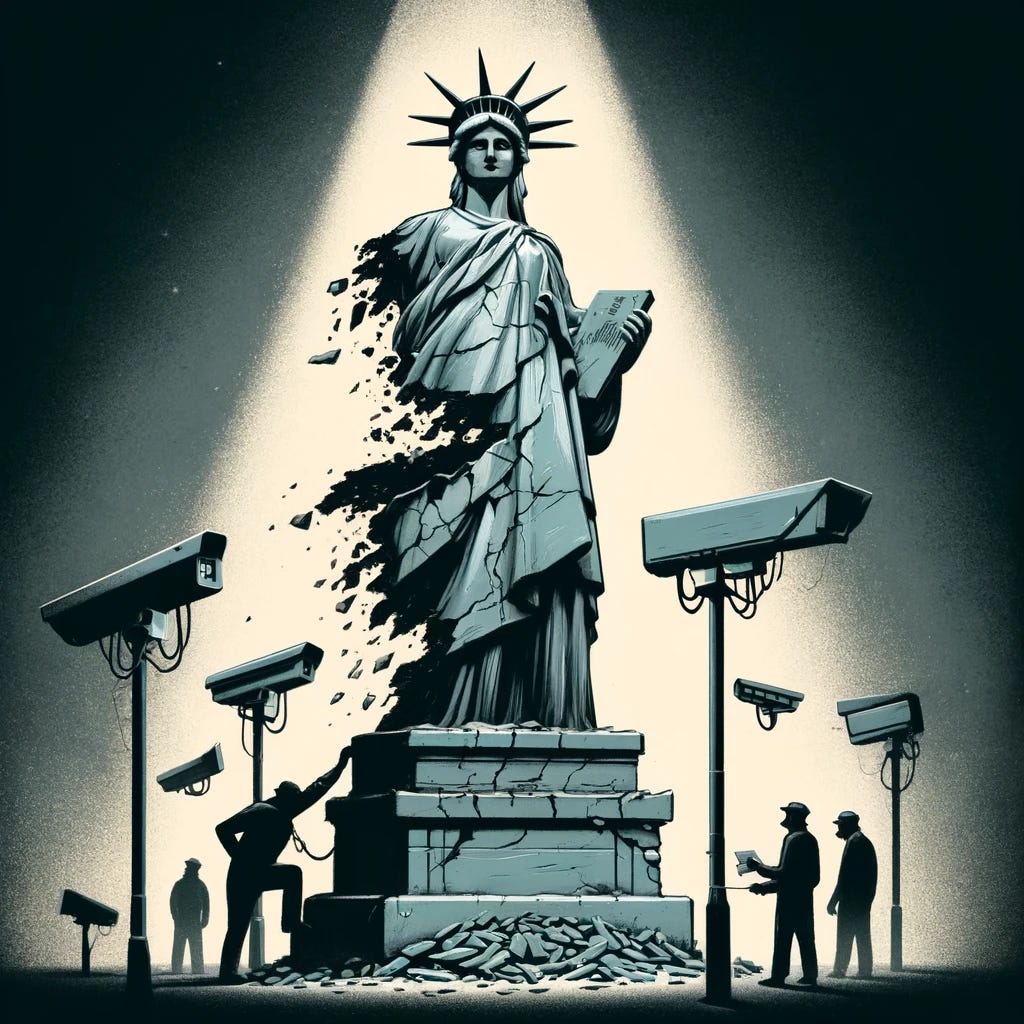Why Are Democratic Countries So Tempted To Monitor Their Populations?
Tracing the Roots of State Monitoring
“For the […] state did not merely aspire to create, under its control, a human landscape of perfect visibility; the condition of this ‘visibility’ was that everyone, everything, had (as it were) a serial number.”
Benedict Anderson, Imagined Communities
Note : After the 14-part series in which we looked at how nation-states are being disrupted by the Internet and globalization, and a 4-part series on why now is the worst time for them, I have concluded that there are two main ways for governments to respond to these disruptions:
Increasingly control what their residents do, via permanent digital surveillance and the use of AI and machine learning (China's way)
Accept that their role will diminish and treat their residents more like customers
In this new series, corresponding to chapter 4 of my forthcoming book, we analyze the (very) slippery slope towards generalized surveillance to which many countries, including the most democratic, are committing themselves.
For as long as states have existed, they have favored means of identifying and cataloguing individuals.
Let's look at an emblematic case: the appearance of the family name.
Today, it seems ubiquitous and natural, yet it's a recent invention in history.
The invention of the family name
Before the introduction of surnames, individuals were often identified by their first name and sometimes by a nickname or descriptive name linked to their profession, place of residence, appearance or personal characteristics, as well as their father or even grandfather.
(In some cultures, it was even common to have a different first name for childhood, adolescence and adulthood1 , which raises an interesting question: why do we take it for granted to have a fixed first and last name, for life?)
However, this system was insufficient for the administrative needs of a centralized state, as it didn't allow individuals to be clearly and reliably distinguished: while there may only be one "John Miller" (= of the Mill) in the village of Chalon, there are dozens in the county of Anjou, and if they move around, it's very difficult to know who's who... not to mention all those who call themselves "John son of John" and other not very evocative nicknames.
Surnames were therefore introduced into Western Europe towards the end of the Middle Ages, gradually spreading throughout the xve , xvie and xviie2 centuries and standardized to meet these administrative needs. In many cultures, surnames are derived from occupation, place of origin, father's first name or other family characteristics.
The adoption of standardized surnames has enabled states to better identify and track individuals, manage taxes, organize military recruitment and enforce laws.
Campaigns to introduce patronymic names often had the primary aim of strengthening the state's ability to collect taxes, and, believe it or not, they sometimes gave rise to significant resistance on the part of the population and local officials, who were well aware that the state was there to seek greater control over their lives3 .
The family name was also a tool of oppression: during the colonial era, Europe often brutally forced colonized populations to adopt a family name, the better to control them. Similarly, as European Jews had no family name, many European governments forced them to adopt one in the xviiie and xix e4 centuries.
Assign you a serial number
And this is just one example of what states put in place to control their populations: there are many others, such as the creation of the land registry, the identity card (made compulsory in France under Vichy in 1940, in particular to better identify and discriminate against Jews5 ), the social security number6 , the tax number, and so on.
Because what is your social security number, your tax number, your identity card number, if not a serial number assigned to you by the State to monitor you better?
Forcing digital nomads and companies to physically incarnate themselves
In the same way, today, governments insist that you provide a home address, even when you're a digital nomad and don't need to have a physical address: after all, for correspondence, an email address would do just fine.
But it's easier to control people when you know where they are (or think you do), because then states have somewhere to send their officials armed with a gun, the only ultimate means they have of forcing individuals to follow their laws.
States therefore need to force individuals and digital companies to physically embody themselves in order to control them - we'll see later the example of someone who arranges not to have to do this, so as not to offer a catch that states could take advantage of.
Increasing surveillance by default
In short, understand that the whole story of the rise of the state goes hand in hand with ever-increasing monitoring, classification and intrusion into people's lives, and that digital tools are a godsend for states, which are all tempted to use them to find out everything about you, whether democratic or not.
On this point, the major differences between democratic countries and others are 1) the promise that access to this data will be restricted and generally subject to the approval of a judge - a promise often badly kept, as we have seen throughout this series, which makes democracies more hypocritical than others on this subject - and 2) the promise of more recourse if this data is used to sue you.
Finally, one of the best ways today to ensure that a state doesn't know everything about you is to stop being a mono-country: by being multi-country, you naturally divide your activities between different jurisdictional spheres, fragmenting the information held by each of them.
We'll talk more about this in the second part of the book, and in later articles.
In conclusion : Western countries are losing an important part of their soft power
By giving in to the temptation to explore these avenues, Western countries fail to realize that they are losing an enormous advantage that was the very foundation of their soft power: they are no longer admirable.
By deviating from their founding principles, by corrupting the spirit of their own laws and constitutions, they show themselves to be hypocrites, and become in part what they even claim to be fighting against.
What's more, many of the states that practice increased surveillance of their populations and try to prevent individuals from leaving are at the same time adopting a schizophrenic approach consisting of offering better tax conditions to foreigners in order to attract them to their soil, thereby adopting a double standard that once again diminishes their legitimacy, but also becomes indispensable if they are to hold their own in an increasingly mobile and competitive world.
And while states, by becoming ever more intrusive and controlling, may indeed win battles here and there, they also create the conditions for their own defeat, as they lose legitimacy, eroding the respect their most enlightened citizens might have had for them. The latter then feel less inclined to help them and more eager to leave them, to imagine and test different models of society, and to concretely diminish their power by forcing them technologically, for example by creating indecipherable encryption or uncontrollable cryptocurrencies.
The less respect citizens have for their state, the more likely they are to go into exile, notably to countries offering them a better package of good conditions, which may include less surveillance, or a similar level of surveillance, but less taxation (and therefore less state power over individuals) in return.
So, the more democratic states monitor and control, the more they lose legitimacy, and the more they motivate part of their population to leave (pushing other countries to offer tempting conditions to welcome them), which makes them lose more revenue, which reinforces their appetite for control, making them lose more legitimacy, pushing more people to leave, etc., in a vicious circle.
And all this at a time when the world's population is becoming increasingly mobile.
We'll see in Part 2 of the book, and later articles, however, that another path is possible, one that I've already touched on: reducing the size of the state, and treating residents more like customers than taxpayers.
Coming soon
This article concludes the series on the slippery slope of surveillance into which many countries, including democratic ones, have slid. In the next article, we'll start a new series on death by regulation, or how over-legislating is a path that more and more nation-states are taking in an attempt not to kill the disruptions that threaten them, but to nip them in the bud, to make them conform, to the point of emasculating them and rendering them harmless...
Stay tuned ! In the meantime, feel free to follow Disruptive Horizons on Twitter, and join the tribe of Intelligent Rebels by subscribing to the newsletter :
Other articles in the series
Seeing Like A State,, op. cit.
Idem. See footnote 1
Rodney Hilton, "Bond Men Made Free: Medieval Peasant Movements and the English Rising of 1381", 1977, via Seeing Like a State, op. cit. See footnote 1
Seeing Like a State, always. See footnote 1
Cécile Desprairies, L'Héritage de Vichy. Ces 100 mesures toujours en vigueur, 2012.
"The Story of the Social Security Number", Carolyn Puckett, Social Security Bulletin, Vol. 69, No. 2, 2009.








I've read a few of your articles here, and I find that a lot of your thinking is compatible with James C. Scott's Seeing Like a State (from the state perspective) and Benedict Anderson's Imagined Communities (from the citizen perspective). You cite both, of course. This particular article (or maybe it was the cumulative effect of reading several articles here) made me wonder if part of the state's defense against the opportunities for freedom offered by the Internet is to capture or create more of the walled-garden versions of the Internet, such as Twitter and "Truth Social." These versions attract people in part by the circular argument implicit in most mass imaginings--an argumentum ad populum. Reinforce imagination with more imagination. Follow the free-thinkers and develop a version of it for the mass of people.
There's a footnote in Democracy in America (Vol. 2, Book 4, Chapter 6) that I now think Anderson would like. Tocqueville says that in an atomized society (one that a representative democracy fosters), it's easy for a tyrant to fall as well as to rise: ". . . the causes which enable gym to succeed easily, prevent them from succeeding long: they rise because nothing opposes them, and they sink because nothing supports them." I wonder how many of your principles of history comport with Tocqueville's insight. What we call representative democracy, which people like Bernard Manin (all these French political theorists!) believe isn't democracy at all, feels like a Ponzi scheme that almost routinely collapses on itself.